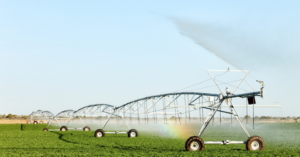Arizona’s alfalfa yields are some of the highest in the world — the state produces an average of 8.3 tons of alfalfa per acre in comparison to the national average of 3.2 tons. State 48’s climate means that they can produce eight to 10 cuttings per year, but while the state has plenty of sunshine days (generally around 300), water is a precious commodity there.
And, water is where things start to heat up. Arizona has been renting approximately thousands of acres of state trust land in La Paz County to a Saudi Arabian-owned farm named Fondomonte Alfalfa Farm for $25 per acre (about one-sixth of the market price). The problem? The Arizona State Land Department hasn’t offered any transparency as to why they’ve issued this “sweetheart” of a deal.
Fondomonte grows the alfalfa and then exports it to feed dairy cattle in Saudi Arabia — 8,100 miles away. In response to limited aquifers and a growing dairy sector, the country has moved a large portion of its alfalfa production to the United States.

In 2014, after sources say Saudi Arabian dried up their own aquifers, Fondomonte purchased 10,000 acres near Vicksburg, Arizona, and an additional 2,000 acres around Blythe, California.
In order to grow alfalfa on the state land trust, the Arabian company draws water from Butler Valley’s groundwater basin. But, that’s just where the debates start. Back in August, the state approved two new deep-water wells. Those wells are estimated to have pumped 3,000 gallons per minute, and according to Arizona news sources, Fondomonte isn’t being charged for their water.
In response to rising public concern, Arizona’s Attorney General Kris Mayes revoked the drilling permits last week.
Just 8 months ago, Arizona state agencies approved new deep-water wells in La Paz County for a Saudi-owned company to pump thousands of gallons of water per-minute.
I can tell you that today – just before Earth Day – that’s not happening. Those drill permits have been revoked.
— AZ Attorney General Kris Mayes (@AZAGMayes) April 21, 2023
Meanwhile, foreign-owned farmland continues to be central to debate. Arizona Rep. Ruben Gallego was one of 27 members of the U.S. House to sign a letter earlier this year to the U.S. Department of Agriculture addressing what they call a lack of oversight in foreign acquisition of U.S. agricultural lands.
The representatives note that “foreign ownership of agricultural land threatens small family farm operations and the overall health of the agricultural supply chain. As the foreign acquisition of farmland increases, it is evident that more oversight is needed to protect local farmers, rural communities, and our national security.”
Last year, Gallego also introduced The Domestic Water Projection Act of 2022, legislation that imposes an excise tax on the sale and export of water-intensive crops grown by foreign companies or governments in areas that have experienced prolonged drought.
“While Arizona experiences the driest conditions in centuries, our water is being given away in a sweetheart deal with Saudi Arabia,” said Gallego.


